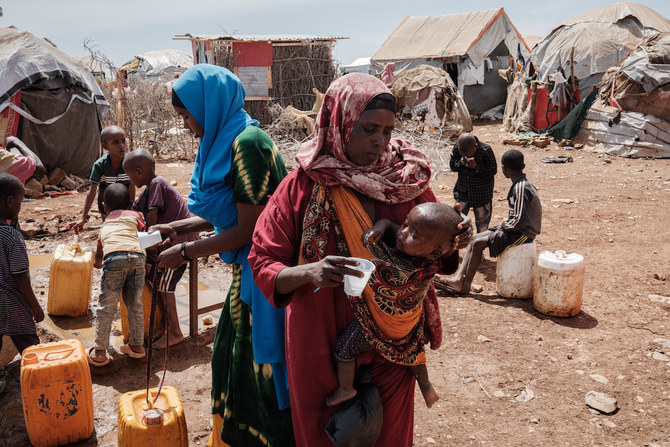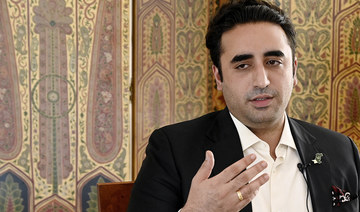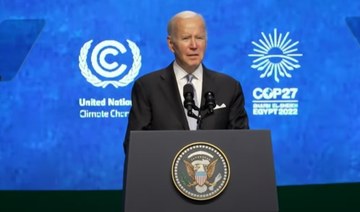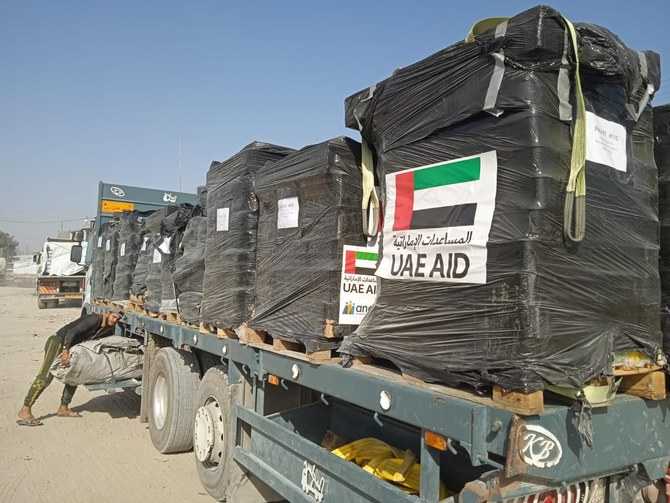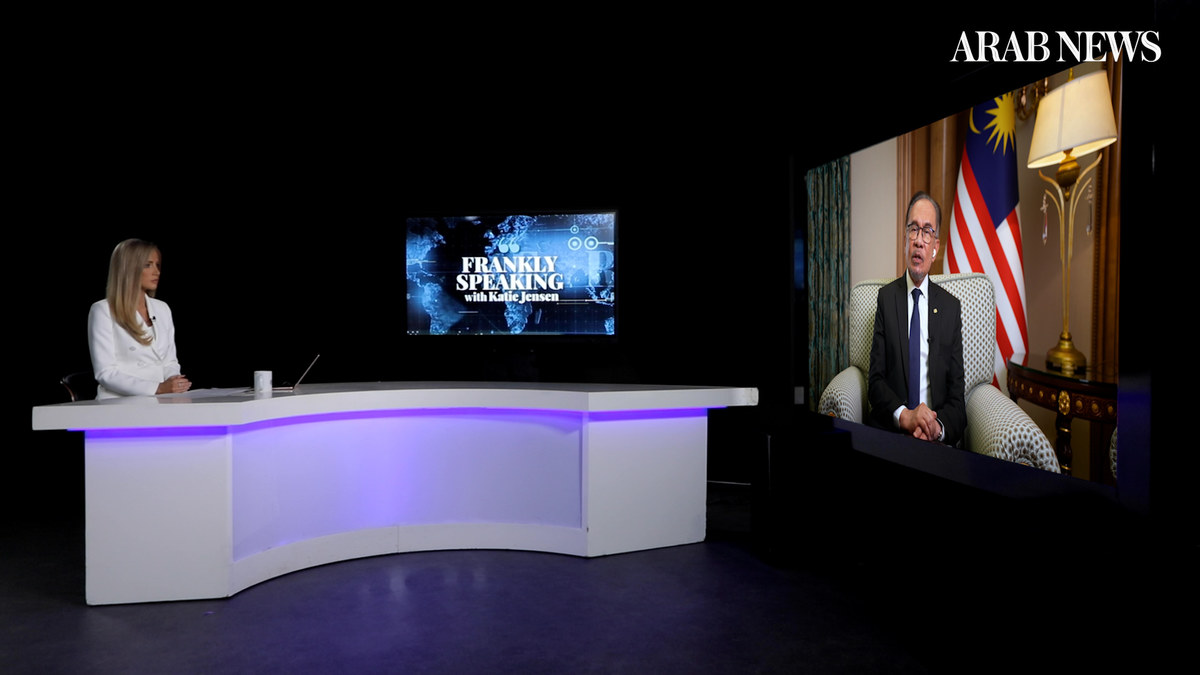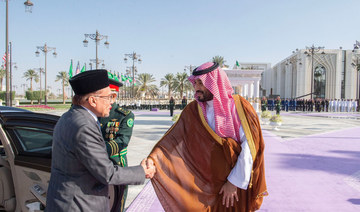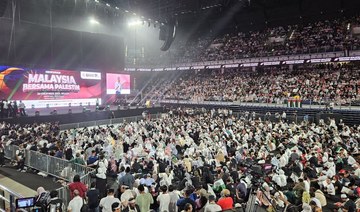DUBAI: For much of the past year, climate change had been high on the global policy agenda as extreme weather events, including floods, dust storms, heatwaves, droughts and blizzards, were reported from different parts of the world.
At the same time, governments pledged to reduce greenhouse-gas emissions, move toward cleaner, renewable sources of energy, take steps to increase resilience and advance the cause of environmental justice. But are these commitments bold enough or too little too late?
Over the holiday period, the UK Met Office warned that the coming year would likely be the hottest on record, indicating that not nearly enough was being done to prevent average global temperatures rising beyond 1.5 C above pre-industrial levels.
In fact, Met Office research suggests that 2023 will be the tenth consecutive year in which global temperatures are at least 1 C above pre-industrial levels.
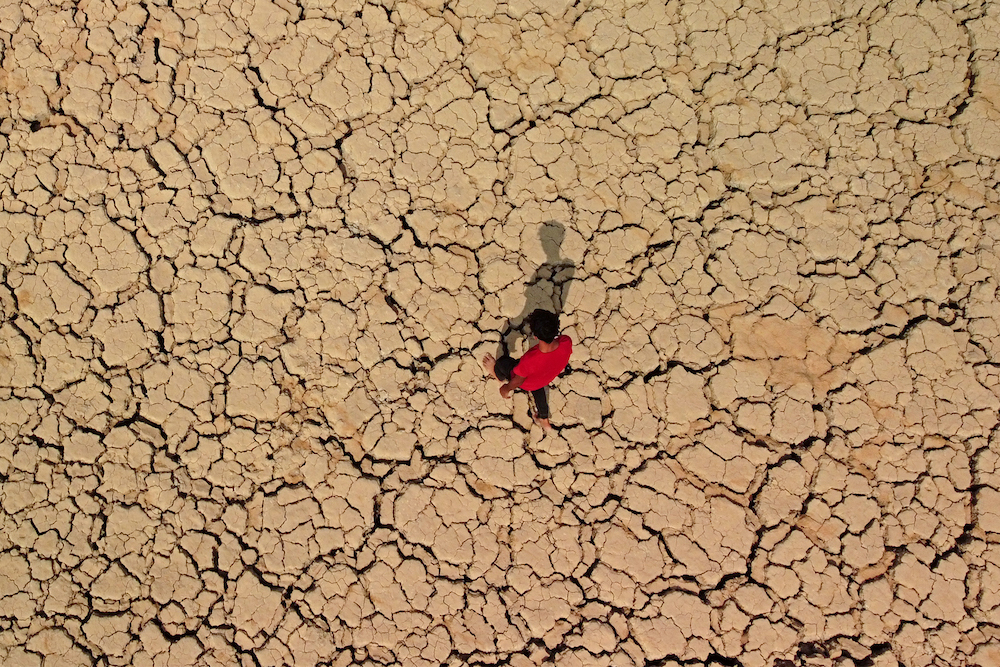
Weather extremes of the past year, such as droughts and flooding, will become more frequent, with Middle Eastern countries facing ‘magnified effects,’ forecasters warn. (AFP)
For many countries in the Middle East and North Africa (MENA), where temperatures are rising at almost double the rate of the rest of the world, the threat posed by an even hotter year cannot be overstated.
Climate-related issues will continue to place a huge financial burden on Arab countries, with some estimates suggesting that adapting to climate change could cost developing countries up to $340 billion annually by 2030.
To help developing countries, particularly those vulnerable to climate change, a decision was taken at the UN Climate Change Conference, COP27, in Egypt’s Sharm El-Sheik in November to establish a “loss and damage” fund.
The fund aims to encourage wealthy, industrialized nations to compensate developing, low-emission countries when they suffer climate-related disasters.
Addressing COP27 delegates, Antonio Guterres, the UN secretary-general, appealed for more ambitious with their emissions-cutting targets in line with the 1.5 C goal agreed in Paris in 2015.

“Our planet is still in the emergency room,” Guterres said, highlighting the need to “massively invest in renewables and end our addiction to fossil fuels.” With too many countries falling short of their targets, “the world still needs a giant leap on climate ambition,” he added.
Climate scientists say weather events of the past 12 months, including record temperatures in the UK, wildfires in Europe and Australia, flooding in Pakistan, dust storms across the Middle East, and the “bomb cyclone” in North America, have proved that far more concerted climate action is needed.
Zoltan Rendes, a European Climate Pact ambassador and chief marketing officer at SunMoney Solar Group, says the impact of rising temperatures is expected to be “magnified” in 2023, especially in hotter countries in the Middle East and Eastern Mediterranean.
A recent study published by the Review of Geophysics found that average temperatures in countries including Egypt, Greece, and Saudi Arabia are projected to rise by approximately 5 C by the end of the century. Climate adaptation, among other measures, is therefore critical for these nations.
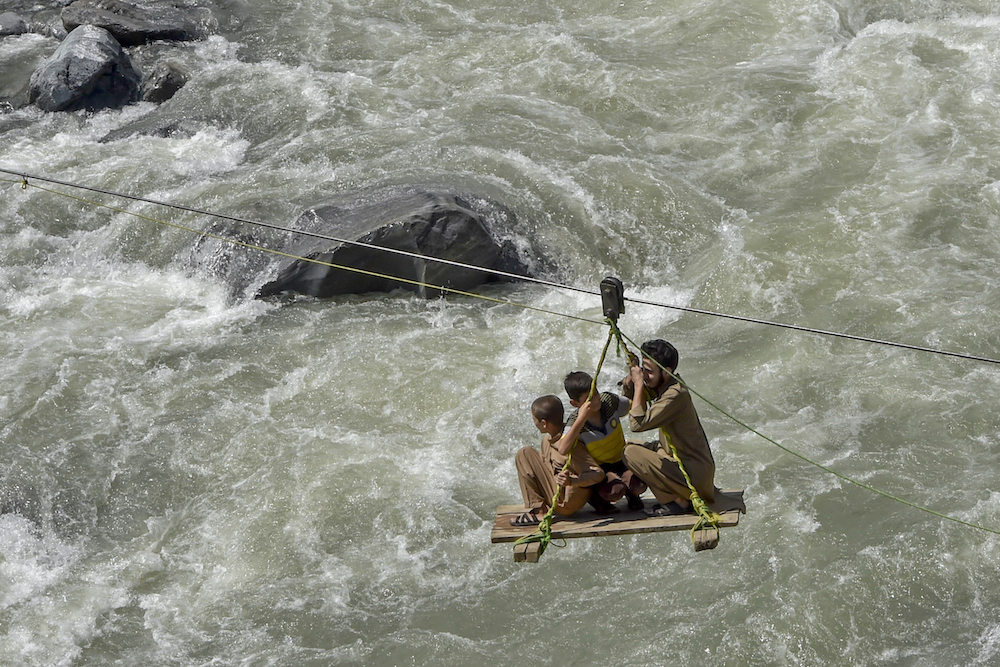
People use a cradle service to cross a flooded river in Pakistan’s mountainous north. (AFP)
“Temperatures could reach dangerous levels that would be near impossible for people to work in,” Rendes told Arab News. “This would lead to decreased productivity and the potential for humanitarian crises due to heat-related illnesses.”
He says daptation strategies, such as increased spending on renewable energy sources and cooling infrastructure, should be implemented immediately.
Using climate-smart agriculture techniques, such as crop diversification, energy optimization through smart power grids, and water conservation measures will also be crucial to the region’s development in the coming decades.
“This rise in temperature can lead to a variety of extreme weather phenomena, such as sandstorms, heavy rains and floods, drought, and heat waves … . These conditions can put tremendous strain on vital infrastructure and resources essential to sustaining life in the region,” Rendes told Arab News.

While dust storms are not uncommon in the Middle East, an increase in wind speeds due to higher temperatures may mean that these storms become more frequent and intense.
Similarly, areas prone to flooding during heavy rainfall could experience an increased risk owing to a potential rise in precipitation, said Rendes.
To compound the problem, according to Dr. John A. Burt, associate professor of biology and head of environmental studies at New York University Abu Dhabi, rising temperatures will lead to more evaporation in the water-scarce Middle East region, adversely affecting ecosystems and agriculture.
“As our seas are a major sink for thermal energy, we can also expect an influence on marine heat waves, and consequent effects on sensitive ecosystems such as coral reefs,” he told Arab News.
“If we look back at August 2017, low winds for a period of just several weeks resulted in a marine heat wave that killed off almost three-quarters of all coral reef areas in the Arabian Gulf.”

A Somali girl collects water from a well at the Tawakal IDP camp on the outskirts of Mogadishu, Somalia. (AFP/File Photo)
This is in part due to the already hostile environment found in most Middle Eastern nations. Even modest changes in temperature and wind speed can have a staggering impact on ecosystems and human health.
“While climate change represents a long-term trend, climate variability — where we can experience much stronger extremes — can have more acute, short-term impacts,” Burt told Arab News.
It is also important to consider that global temperatures are also influenced by El Nino and La Nina events, which cause warmer or cooler periods, respectively, based on changes in ocean temperature.
“These phenomena refer to large scale wind patterns that occur in the southern Pacific Ocean, which have the capacity to affect weather patterns globally as our atmosphere and seas are one large and complex interconnected system,” he said.
Over the last three years, La Nina has cooled down the average global temperature, an effect that is expected to come to an end in 2023 — bringing about warmer weather conditions.

“It is important to recognize the potential impacts of these climate events as they can lead to significant human and economic costs,” Rendes told Arab News.
For example, an increase in precipitation during an El Nino could mean flooding risks for some countries, while a decrease in rainfall during a La Nina could result in water shortages.
Rendes added that areas of the Middle East suffering from drought might are likely to experience reduced rainfall, resulting in severe water scarcity.
Consequently, heat waves could become far more frequent and potentially longer lasting as temperatures in the region scale unprecedented highs.
In turn, this could lead to an increased risk of heat-related illnesses such as dehydration, sunstroke, and heat exhaustion, according to Rendes.

In dazzling turquoise waters off Egypt's Red Sea coast, scuba divers swim among delicate pink jellyfish and admire coral -- but the rebounding tourism sector is worrisome for the fragile marine ecosystem. (AFP)
“It is essential that governments work together to implement policies that address both climate change mitigation efforts as well as adaptation strategies,” he told Arab News.
The UN Environment Programme’s recently published Emissions Gap Report 2022 shares the same conclusions.
It shows the world is not on track to reach the 2015 Paris Agreement goals. Instead, global temperatures are set to reach 2.8 C by the end of the century, while temperatures in 2023 are on course to reach between 1.08 C and 1.32 C above the pre-industrial average.
The report also says that the world must cut emissions by 45 percent to avoid global catastrophe and that multilateral action is needed to tackle the crisis.
Several Arab countries are taking steps to mitigate climate change. For instance, Saudi Arabia has announced its intention to reach carbon neutrality by 2060. The Kingdom is investing in renewable energy sources like solar and wind to achieve this goal.
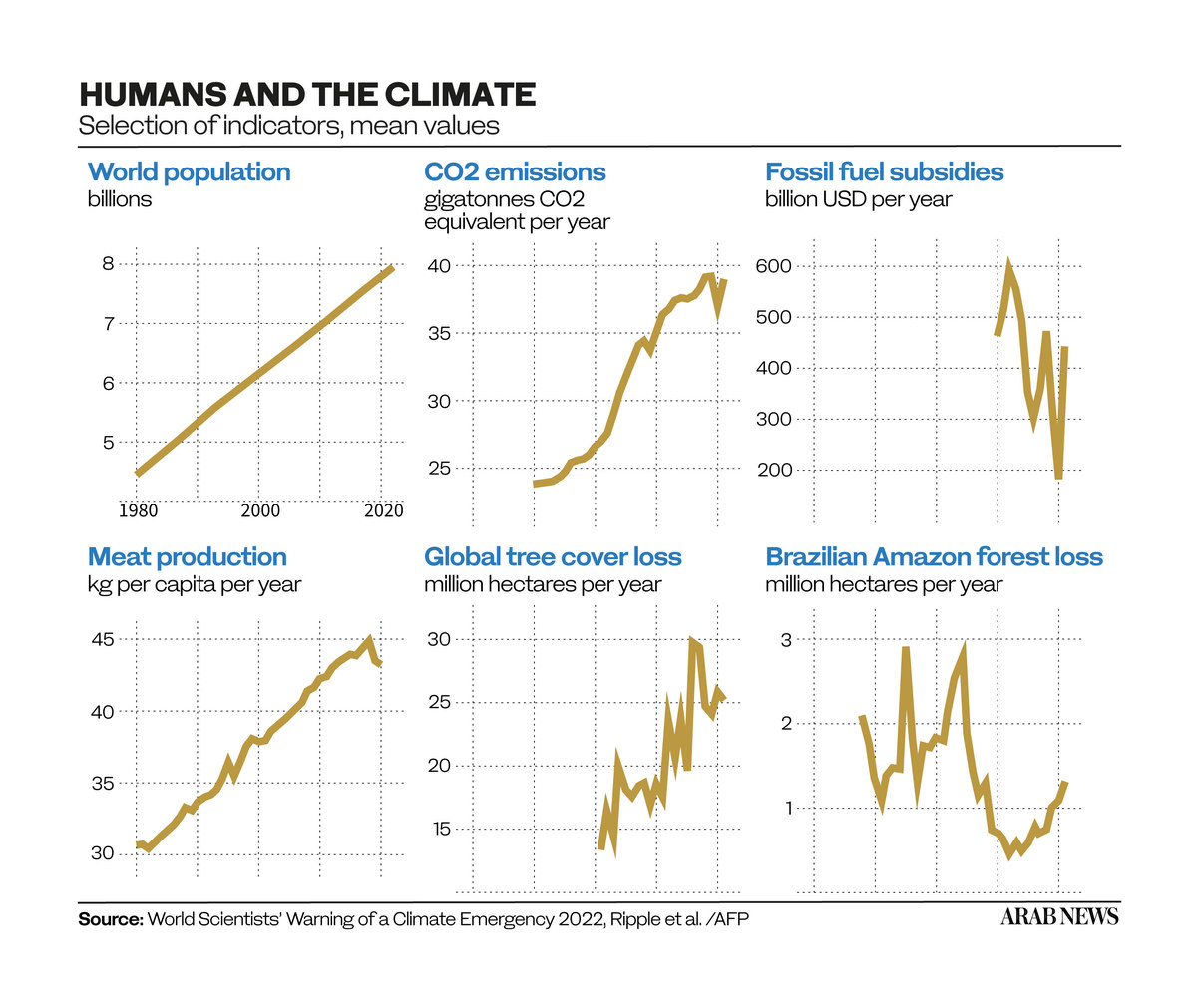
The Saudi government is also planning to reduce its reliance on fossil fuels and establish an exchange platform for carbon offsets and credits for the MENA region.
“By 2023, Saudi Arabia aims to complete 840 MW of solar photovoltaic projects, and is currently in the process of constructing an additional 13 renewable energy projects with a total capacity of 11 GW,” Rendes told Arab News.
The Kingdom has announced one of the world’s most significant carbon capture and storage hubs on the east coast of Jubail that will be up and running by 2027.
Concurrently, ambitious projects such as the Saudi Green and Middle East Green Initiatives, launched by Crown Prince Mohammed bin Salman in 2021, aim to boost emissions reductions, carbon capture and green-energy transition throughout the region.
Similarly, the UAE is taking action to reduce emissions from power generation and transportation to achieve carbon neutrality by 2050.
“The UAE government and leadership have wholeheartedly invested in solar energy projects, setting the stage for them to be the first country in the Middle East and North Africa region with a national pathway towards net zero emissions,” Rendes told Arab News.
He cautions that as with any significant undertaking, cooperation among the governments of the Arab region is a prerequisite for meaningful progress.
“The time to act is now — let’s make sure that 2023 isn’t too late,” Rendes told Arab News. “Make no mistake, the planet will survive. But let’s make sure that we survive with it too.”




